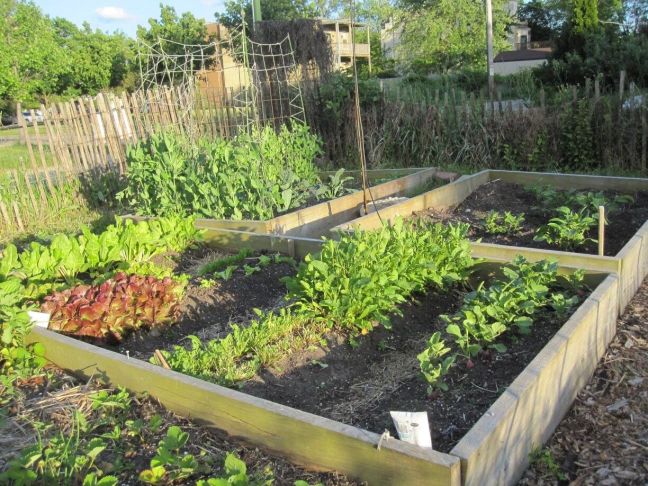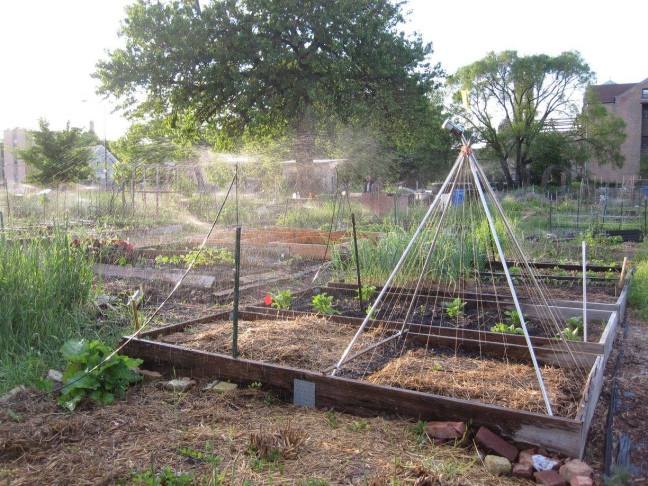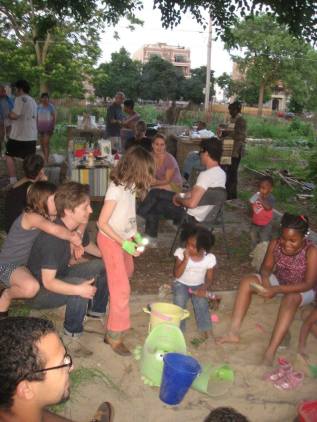By Andrea V. Watson
A group of gardeners in Woodlawn have been circulating an online petition to save two long-standing community gardens that together contain 175 plots.
They’re aiming to collect at least 1,000 signatures and have already collected more than half of their goal. Sign the petition here.
The garden committee was told on March 17 that both the 65th and Woodlawn Community Garden and Kumunda Garden, 6435 S. Kimbark Ave., would be closing “effective immediately.” The news was shared through an email by the land’s owner, First Presbyterian Church of Chicago, located at 6400 S. Kimbark Ave.
Messages left with the church weren’t returned.
Gardeners have made several attempts to communicate with church leadership, but received no response for weeks, until Tuesday, when one gardener tried to do an interview with another news reporter, said Meg Mass, one of the garden’s committee leaders and longtime Woodlawn resident.
Within minutes, gardeners received an email from the church telling them to leave, and the pastor herself arrived to tell them they were trespassing, she said.
“We needed to vacate the premises immediately because it’s private property and we no longer had a contract in effect, ” Mass said, adding that they would need to schedule a time to return and remove their tools.
Established in 2006 and 2013, 65th & Woodlawn and Kumunda Gardens were started to help support the health and economic sustainability of the neighborhood by directly addressing the healthy food shortage.

Food justice and inclusivity have been the garden committee’s primary mission, the group shared in a press release.
They were never given any explanation for the decision to close the gardens, Mass said. There had never been any concerns or issues between the community and church, she said.
“As far as we can see, this is out of nowhere,” she said, explaining that the church has had a long history of support for food justice and gardens on its many properties.
The church has had a new pastor for about a year now, but the previous one was “a huge advocate of the garden,” Mass said.
“He had a garden plot. He always came to our volunteer days. He was very involved in the garden program.”

Earlier this month, they were told that the gardens would be closed permanently, which then led the committee to push for a meeting with the church’s leaders.
“Initially, we couldn’t meet, but then we were allowed to meet with three people in administration,” Mass said. “They asked us to prepare [materials] of how the gardens befitted the community.”
“To hear that they weren’t aware that there were any benefits to the community—it doesn’t feel right. We have been working together for years. It suggests a lot of institutional knowledge was lost.”
Before the garden committee could even finish preparing a document to present, they received an email March 17 telling them a decision had been made. Since then they’ve written a letter signed by all the gardeners, and have made several attempts to meet, but they hadn’t received a response until Tuesday’s trespassing email.
If there was some kind of issue gardeners say the church should’ve communicated with them first, because the gardens feed 175 families, in addition to another 100-plus families at the food pantries.
“I can’t understand how a community-oriented church could cut off food security for that many people without having really strong reasons and having already tried all the alternatives,” she said.
They are now asking for signatures and letters of support to help save the gardens, which they also say serve as a major public food source in the neighborhood.
Gardeners said that the gardens don’t cost the church any money and are supported through plot fees and donations from volunteer groups.
Losing the gardens would mean they’d be losing money and years of work, Mass said.
“We have years of boxes that people have built, we have water collection structures, sheds, lawn mowers, wheel barriers, we have a lot of things on site,” Mass said. “This is going to take weeks to dismantle and once it’s dismantled it’ll take years to rebuild and thousands and thousands of dollars. It’s all been paid for by the community.”
Each plot is 10-by-10-feet and neighborhood gardeners dig and grow organic produce annually. For more than 10 years, community members have tended to the gardens year-round to help feed their families and volunteer their time to help maintain them. Over a dozen plots are grown specifically for the food pantry, and there are garden beds along the fence for passing neighbors to pick fruit and vegetables.
In addition to individual family’s harvests, the gardens donated more than one ton of organic produce to the church’s food pantry last year.
The gardens do more than feed people, though, Mass said.
It’s a “beautiful green space” where the community gathers. The gardens host groups of to learn about healthy food and the benefits of restoring abandoned lots to productive, healing community use.

“I just don’t want to see decisions made lightly that hurt so many people,” Mass said.
One of the gardens’ early leaders, Benja Murphy, posted on the online petition page that he was heavily involved and helped lead the gardens for five years between 2008 and 2013. He led the process of expanding from three plots in 2007 to 31 in 2008, among other initiatives.
“I and many others in the community poured our heart and soul into this labor of love, turning these vacant lots into safe havens and defacto town squares,” he wrote. “I’ve seen people meet and fall in love, make friendships, and learn to provide healthy food for themselves. The garden really has become a meeting place where neighbors that wouldn’t know each other get a chance to create community and have real connections in the alienating environment of the city.”
Sign the petition here.

Shared on Create Space…gardens grow more than fruit and veg, they grow a sense of community! Wishing you every success!
LikeLike